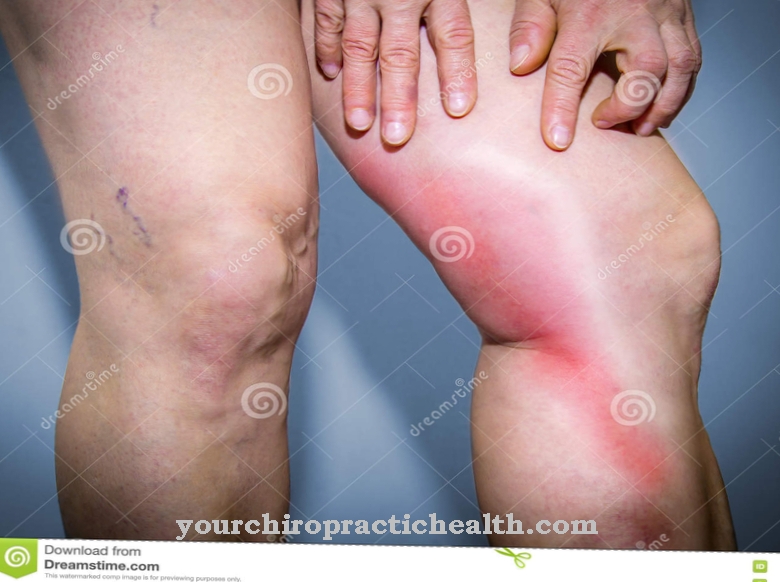As Cor pulmonale This is an enlargement of the right heart as a result of a pressure load from a lung disease. A distinction is made between an acute and a chronic form. The main symptoms are exertion-dependent shortness of breath and poor performance.
What is cor pulmonale?
The term cor pulmonale comes from Latin and means something like "lung heart". An increase in pressure in the lungs leads to high blood pressure in the pulmonary circulation. The result is a pressure load on the right heart, more precisely the right ventricle. There is an enlargement and dilation of the right heart and ultimately a heart failure of the right heart, i.e. heart failure.
root cause
The cause of the cor pulmonale is an increased resistance in the pulmonary circulation, against which the right heart has to pump. An acute cor pulmonale is usually caused by a pulmonary embolism. In pulmonary embolism, an artery in the lungs becomes blocked with a blood clot (thrombus). Usually this is a thrombus from the leg or pelvic veins.
If a large pulmonary artery is completely blocked by the thrombus, blood can no longer flow through this vessel, so that blood congestion occurs. This happens not only in the blocked artery, but also in the rest of the pulmonary arteries. Although these are actually functional, they are used as "alternative routes", so to speak, for the relocated artery and thus overstrained. As a result, the blood backs up to the right heart.
An asthma attack or a pneumothorax, i.e. the collapse of a lung, can also cause an acute cor pulmonale. The chronic cor pulmonale develops much more slowly. The most common cause here is chronic obstructive pulmonary disease (COPD). Chronic obstructive pulmonary disease is the term used to describe various diseases that are characterized by coughing with phlegm and shortness of breath.
A typical COPD is chronic bronchitis, a chronic inflammation of the bronchi that mainly affects long-term smokers. The pulmonary vessels are severely narrowed by the inflammatory processes in the lungs. This again leads to an increase in pressure in the pulmonary circulation and thus also to stress on the right heart.
You can find your medication here
➔ Medicines against fatigue and weaknessSymptoms, ailments & signs

© snapgalleria - stock.adobe.com
When it comes to the symptoms of cor pulmonale, a distinction must again be made between the acute and the chronic form. The acute cor pulmonale develops very quickly. Suddenly there is severe shortness of breath. Without treatment, the right heart will fail within a very short time. The result is sudden cardiac death.
A chronic cor pulmonale develops over years. Since the right heart becomes weaker and weaker due to the pressure load, it can no longer adequately pump the venous blood out of the body. There is a backlog in the veins of the great body circulation. This increases the pressure in the veins and fluid is pressed into the surrounding tissue. This process can be seen in leg and ankle edema, for example. The blood also accumulates in the organs.
This can result in enlargement of the spleen and liver. Furthermore, gastrointestinal complaints can occur as a result of the backflow. One then speaks, for example, of congestive gastritis. A congestion of the neck veins may be visible. Because the right heart can pump less blood, less blood reached the lungs, and consequently less oxygen-rich blood reached the left heart.
There is an insufficient supply of oxygen in the body. The skin of those affected may turn blue (cyanosis). In addition, the patients suffer from shortness of breath. They are no longer physically resilient and quickly exhaust.
diagnosis
If cor pulmonale is suspected, an EKG is first made. Here, cardiac arrhythmias are usually seen, sometimes an absolute arrhythmia is visible. This is followed by x-rays and ultrasound examinations of the heart and a measurement of the oxygen saturation in the blood. In response to the lack of oxygen, there are more red blood cells in the blood. This is known as polyglobules.
Altered heart tones and murmurs may be diagnosed during auscultation of the heart. A catheter examination can be used to measure pressure in the right heart.
Since the cor pulmonale is more of a symptom than an independent disease, the diagnosis of the underlying disease is of great importance.For this, procedures such as lung function tests, spiroergometry and X-ray and ultrasound examinations of the lungs are used.
Complications
A cor pulmonale (lung heart) is caused by various diseases of the lungs, which can be associated with different complications. If left untreated, progressive cor pulmonale leads to deterioration. This can lead to death in a few years. The affected person has a marked decrease in quality of life and suffers from a decrease in performance.
In addition, there is a change in the lungs and heart, so that lung failure or heart failure (heart failure) also occur. In addition, the patient often has to add oxygen, which further affects the quality of life. For example, the cor pulmonale is caused by a pulmonary embolism. This is initially associated with shortness of breath and chest pain.
In the course of the disease, inflammation of the lungs (pleurisy) can occur. Pneumonia is also possible (pneumonia). In the worst case, this inflammation can spread over the entire body and thus trigger sepsis, which can turn into septic shock. A pneumothorax is also considered to be the cause of the pulmonary heart.
If the lung collapses for a long time, water can collect on the lungs and lead to pulmonary edema. This can also lead to inflammation of the lungs. In asthma, another possible cause, the most dreaded complication is the status asthmaticus. This is a medical emergency that cannot easily be treated with anti-asthmatic drugs.
When should you go to the doctor?
In the case of cor pulmonale, a doctor must be consulted in any case. This disease is life threatening and must definitely be treated. As a rule, a doctor should be consulted if the person affected suddenly becomes short of breath. Pain in the heart area can also occur. In this case, however, an emergency doctor should be called immediately or a hospital visited. Visual problems or dizziness can also indicate cor pulmonale.
The affected person may also have stomach or intestinal problems, which should also be examined. If the patient's skin turns blue, immediate treatment is essential.
The patient must avoid any physical strain. Treatment is usually carried out in the hospital through an operation. Even after the procedure, regular examinations by a cardiologist are necessary to avoid further heart problems. Continuous ventilation is also necessary in severe cases of cor pulmonale.
Doctors & therapists in your area
Treatment & Therapy
The therapy of the cor pulmonale takes place through the therapy of the underlying disease. In pulmonary embolism, various drugs are given to dissolve the thrombus. The clot may need to be surgically removed.
Chronic obstructive pulmonary diseases are also mainly treated with medication. So-called bronchodilators widen the airways. Cortisone has an anti-inflammatory effect and so-called mucopharma loosens stuck mucus. This relieves the lungs and the right heart. The most important measure in the treatment of COPD and thus also of the cor pulmonale is an absolute ban on smoking.
In support of the treatment of the underlying disease, diuretics, nitrates or ACE inhibitors can be used to lower the pressure in the pulmonary circulation. Permanent oxygen or even ventilation may be necessary.
Outlook & forecast
The prognosis for the cor pulmonale is described by doctors as very unfavorable. The chronic disease has a progressive course that cannot be stopped. Only the progress of the cor pulmonale can be influenced. Without medical treatment, the risk of a fatal outcome increases within a few years of the onset of the disease. With medical care, the lifespan is extended and the quality of life is also significantly improved.
With a cor pulmonale, the patient feels energized, limp and tired. The organism is not able to mobilize new forces. This leads to a gradual process of physical degradation that ends with death. Organ changes occur that lead to irreparable damage. There are no ways to restore the tissue or the functioning of the organ.
Prescribed medicines improve wellbeing and can help improve breathing. In the worst case, the drugs remain ineffective. The patient's survival can only be ensured through an organ transplant. A heart-lung transplant is necessary, which is associated with many risks. The patient can intervene supportively within the course of the disease. Avoiding nicotine consumption has a positive effect on breathing and can alleviate existing symptoms. However, this does not guarantee a cure.
You can find your medication here
➔ Medicines against fatigue and weaknessprevention
In the case of chronic cor pulmonale, the best prevention is an optimal treatment of the chronic obstructive pulmonary disease. Any pollutants, especially smoking, should be strictly avoided. An acute cor pulmonale is difficult to prevent. However, patients should be made aware of the dangers of leg vein thrombosis. If the thrombosis is treated early, a pulmonary embolism with subsequent cor pulmonale can be prevented.
Aftercare
Aftercare options are generally only available to a very limited extent with cor pulmonale. Since the disease is treated by surgery in most cases, the person concerned must then recover and allow the wound to heal completely. Likewise, unnecessary stress on the body must be avoided, especially the heart and lungs should not be stressed.
In the case of Cor pulmonale, those affected are also dependent on taking medication. Care should be taken to ensure that it is taken regularly, and the interactions with other drugs should also be discussed with the doctor. In some cases, the affected person is also dependent on external ventilation with oxygen if lung function cannot be adequately restored.
With cor pulmonale, the person concerned should not smoke under any circumstances. A healthy lifestyle with a healthy diet also has a very positive effect on the further course of the disease. Since the illness often leads to psychological complaints, it is also advisable to get support and therapy from a psychologist. Whether Cor pulmonale will lead to a reduced life expectancy cannot generally be predicted.
You can do that yourself
In the case of cor pulmonale, the underlying disease must first be treated. If the heart is already weak, the doctor will also recommend a low-salt diet and dehydrating medication. Sometimes dietary supplements and digitalis are also prescribed. Smokers should stop smoking immediately, as the symptoms are usually caused by a serious lung disease.
It is advisable to work out these measures together with the responsible doctor. Long-term smokers often need therapeutic support when quitting, but they can also make it easier with nicotine patches and the like. In any case, the trigger of the causal disease must be determined and remedied immediately.
If symptoms persist, hospital treatment is required. The acute cor pulmonale is a medical emergency that must be treated immediately. First aiders should alert the ambulance immediately and get the person affected into a stable lateral position.
Sometimes life-sustaining measures must also be carried out. In addition, appropriate arrangements must be made for a longer hospital stay. In the long term, a cor pulmonale must always be treated medically. Daily measures such as a healthy diet, exercise and the renouncement of luxury foods can be used in addition.


.jpg)
.jpg)
.jpg)
.jpg)







.jpg)

.jpg)
.jpg)











.jpg)